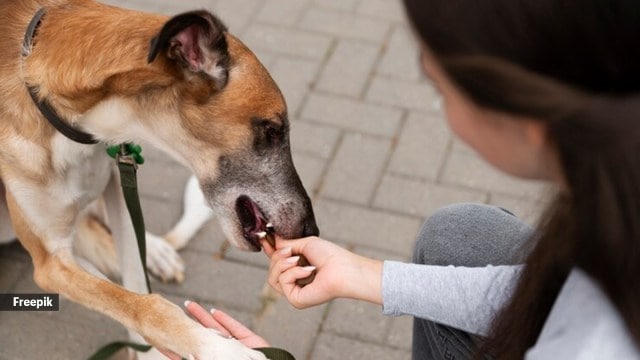📣 For more lifestyle news, click here to join our WhatsApp Channel and also follow us on Instagram
Can pets get addicted to treats?
Many pet treats are loaded with enticing flavours, preservatives, and additives, which can trigger behaviours in animals that resemble addiction.
 Pets that are overly dependent on treats may display certain signs (Source: Freepik)
Pets that are overly dependent on treats may display certain signs (Source: Freepik)Pet owners love spoiling their furry companions with treats, but have you ever wondered if dogs and cats can actually get addicted to them? Many pets develop an intense craving for treats, sometimes even refusing their regular food in hopes of getting more. This raises questions about whether treat consumption can become more than just a habit.
With pet treats often packed with flavours, preservatives, and enhancers, some animals may exhibit behaviour that looks a lot like addiction — begging excessively, fixating on treat time, or even acting out when they don’t get their fix. But is this just learned behaviour, or could there be something deeper at play?
Addiction-like behaviour in dogs and cats
Dr Deepraj Prajapati, senior veterinarian at RD Pet Hospital Ambedkar Nagar, tells indianexpress.com, “While the term ‘addiction’ is typically associated with substance abuse in humans, pets can develop strong conditioned responses to highly palatable treats. Many commercial pet treats are formulated with flavours, fats, and salts that appeal intensely to a pet’s natural taste preferences.”
These ingredients can stimulate the brain’s reward pathways, he adds, leading to a learned behaviour where the pet craves the treats. “However, this response is more about conditioning and reinforcement rather than a true addiction in the clinical sense. In essence, pets may become overly enthusiastic or persistent in seeking out treats, but this behaviour is driven by positive reinforcement rather than a physiological dependence,” states Dr Prajapati.
 For cats, consider options like freeze-dried fish treats or even a brief play session as a reward. (Source: Freepik)
For cats, consider options like freeze-dried fish treats or even a brief play session as a reward. (Source: Freepik)
Signs that a pet may be overly dependent on treats and how to manage it
Pets that are overly dependent on treats may display signs such as constant begging, fixating on treat bags, or ignoring commands unless a treat is offered as a reward. “Some dogs might even exhibit signs of distress or frustration when treat time is delayed or denied. Owners should be mindful of these behaviours as they can lead to unbalanced nutrition and weight issues over time,” notes Dr Prajapati.
To manage this, the expert says that it is advisable to establish clear boundaries and a structured treat schedule. Incorporating treat-based training sessions while gradually reducing the frequency of treat rewards can help recalibrate your pet’s expectations. Positive reinforcement through affection, play, or verbal praise can also be effective substitutes for treats over time.
Is it possible to safely replace treats with healthier alternatives without upsetting a pet’s routine?
Dr Prajapati agrees, saying, “Yes, it is entirely possible to substitute conventional treats with healthier alternatives while maintaining your pet’s routine. Options such as small pieces of cooked lean meat, carrots for dogs, or specially formulated low-calorie treats can provide the necessary reward without the excess calories and additives. For cats, consider options like freeze-dried fish treats or even a brief play session as a reward.”
Gradual substitution is key — start by mixing a small portion of the healthier alternative with the regular treat until your pet adapts to the new reward. Additionally, non-food rewards like extra playtime or affectionate attention can also reinforce positive behavior effectively.
📣 For more lifestyle news, click here to join our WhatsApp Channel and also follow us on Instagram
Photos



- 01
- 02
- 03
- 04
- 05
























